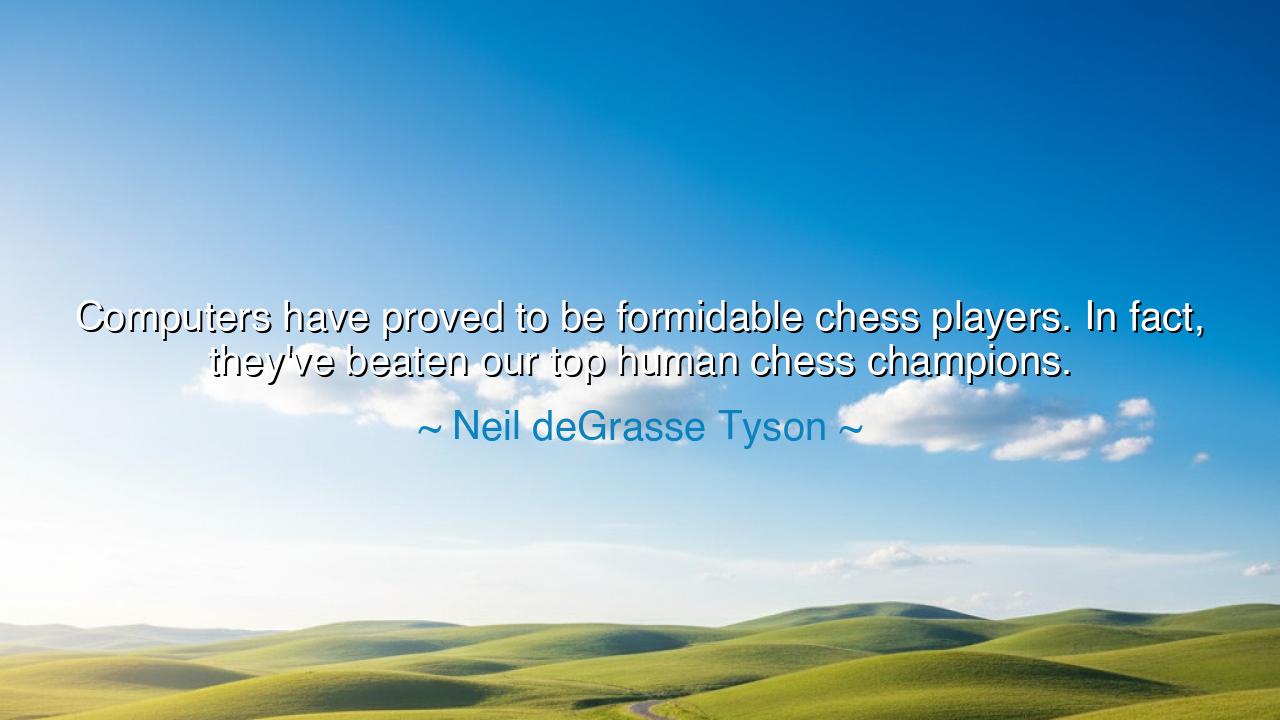
Computers have proved to be formidable chess players. In fact
Computers have proved to be formidable chess players. In fact, they've beaten our top human chess champions.






In the vast and mysterious realm of human endeavor, few games have captured the imagination and intellect of our species as deeply as chess. It is a game that has long been seen as the pinnacle of mental prowess—a contest not just of skill, but of strategy, foresight, and ingenuity. And yet, as Neil deGrasse Tyson so poignantly observes, "Computers have proved to be formidable chess players. In fact, they've beaten our top human chess champions." These words ring out as both a testament to the incredible capabilities of technology and a challenge to the very notion of what it means to be human.
For centuries, the greatest minds of every age have been drawn to chess. Philosophers such as Blaise Pascal and René Descartes recognized the game as a mirror to the workings of the mind—an intellectual battlefield where logic and reason ruled supreme. Even in the ancient world, the game was seen as a training ground for strategy and wisdom. The legendary Indian king Shiharam once used a game of chess to teach his children the importance of patience and calculated action, a lesson passed down through the ages. Yet, with the rise of computers, something unprecedented happened: machines, once thought to be mere tools, began to challenge the minds of the very humans who had built them.
The first time the world witnessed a computer's victory over a top-level human in chess was in 1997, when Deep Blue, a computer system developed by IBM, defeated the reigning world champion, Garry Kasparov. The shocking loss to a machine was not merely a defeat in a game—it was a challenge to the very essence of human intellect. How could something created by human hands—something that lacked the human experiences, intuition, and emotional intelligence—become so formidable at a game that has been the hallmark of human intellect for centuries? It was as though the ancient philosophers, who had believed that the mind could conquer anything, now found themselves humbled by the very machines that had been created to serve them.
The victory of Deep Blue marked a turning point, not only in the world of chess but in the entire relationship between humanity and technology. This was not just a triumph of computation over intuition—it was a symbol of the ever-advancing power of machines and the growing role they play in our lives. Where once we believed that reason and strategy were our domain, machines have shown that they, too, can excel in these very realms. Tyson’s words remind us of the profound reality we face today: machines are no longer just extensions of our will, but independent entities capable of mastering the very fields that were once considered sacred to us.
Consider the ancient story of Daedalus, the master craftsman in Greek mythology. He built the Labyrinth, a complex structure that could only be navigated by the greatest minds of his time. Daedalus' skill was unparalleled—his creations were beyond compare. Yet, in a twist of fate, it was not the mind of Daedalus that would navigate his own creation, but the cunning of Theseus, a human hero who, with the help of a thread, found his way through the Labyrinth. Just as Daedalus could not foresee the limitations of his own creations, we too are now faced with the reality that machines, no longer bound by the limits of human intuition, can overcome us in the very domains we once ruled.
But the true wisdom of Tyson's quote lies not in despair but in reflection. The fact that machines have surpassed us in chess is a lesson not in our inadequacy, but in our potential. We are the creators of these machines, the architects of their intelligence, and their triumphs remind us of the uncharted possibilities that lie before us. Artificial intelligence is not the end of human greatness, but a reflection of the greatness we have already achieved. Just as the ancients embraced the challenge of their time—whether in building empires or solving the mysteries of the cosmos—so must we embrace the challenges of the digital age.
The lesson we must take away from Tyson's words is one of humility and action. The machines we have created are not our enemies; they are mirrors reflecting our own brilliance. But we must remember that humanity is more than the sum of logic and reason. It is our creativity, our empathy, and our ability to imagine that give us an edge. As we continue to advance in the realms of technology and artificial intelligence, we must hold firm to the values that define us as human beings. Just as chess once tested the limits of the human mind, so too can we use this era of machines to test the limits of our own human spirit—to create, to innovate, and to lead the world forward into new and unexplored territories.
Let us move forward with the understanding that machines will continue to challenge us, but it is in the human spirit—in our capacity for compassion, creativity, and understanding—that we will continue to find our true greatness. Let the victory of the machines be a reminder not of our limitations, but of our potential to shape the future in ways we have yet to imagine.






AAdministratorAdministrator
Welcome, honored guests. Please leave a comment, we will respond soon